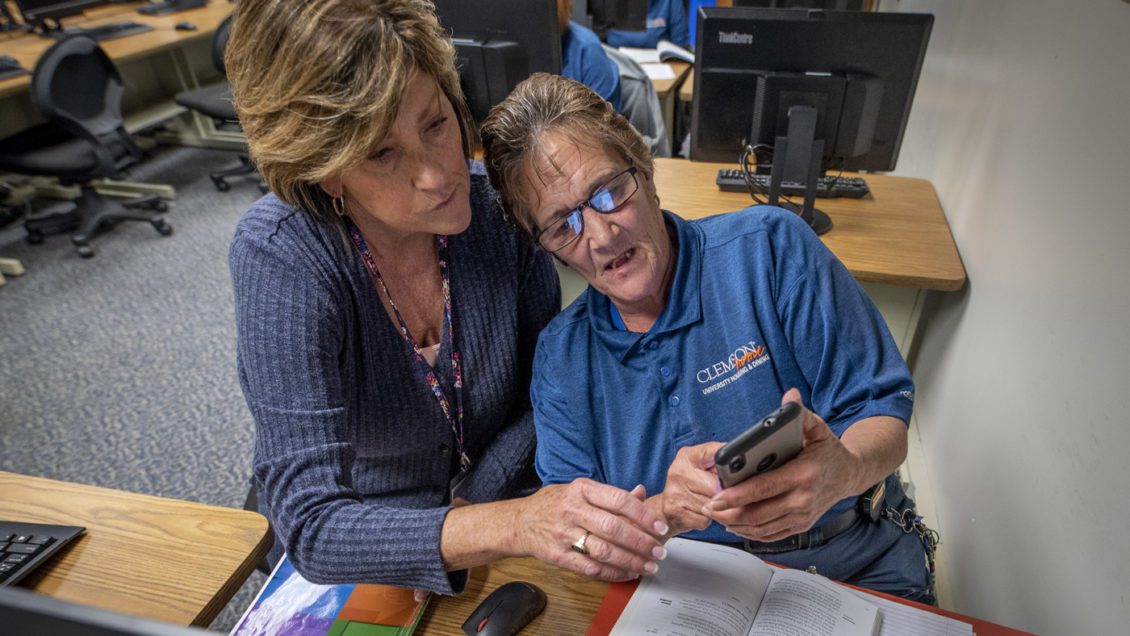
Clemson University stands as one of the premier institutions of learning in the nation, awarding more than 6,700 degrees each year to graduates who go on to elevate industry, education and research all over the world through virtually every vocation imaginable. Standing behind those students and its internationally renowned faculty are thousands of employees – painters, groundskeepers, cooks, cleaners, bus drivers, first responders and many others – who support the University and keep it running smoothly. The school places a high value on this important behind-the-scenes army of workers and offers resources for learning to them too.
The Work FORCE (Focus on Retaining and Continuing Education) program was created in 2013 to give employees the opportunity to develop skills that would enhance their ability to perform their job duties.
The program was established after a long and concerted effort by several University organizations including the Black Faculty and Staff Commission and the Commission on Women, and with the steadfast support of leaders and supervisors within campus housing and dining services. Because of this collaborative effort, employees in need of the training get the time and resources to take the classes. Currently the program is offered to housing and dining employees but may be made available to all staff soon.

“This program is so important,” said Vivian Morris, director of engagement and retention for Clemson’s Human Resources department. “Employees who enhance their reading, math, and computer skills will be better equipped to perform their current jobs and participate in career growth opportunities.”
Morris said the program was created in 2016 when housing and dining employees expressed interest in reading and comprehension classes and communicated the need to members of the Black Faculty and Staff Commission, who brought the need to the Office of Human Resources. The following year, students expressed interest in incorporating math along with the reading, so it was added to the curriculum.
Some two dozen Clemson employees have attended the classes each semester, which are held on the second floor of the R.M. Cooper Library. The curriculum is designed to accommodate any level of student: Some sign up to attain their GED degrees, some to brush up on long-forgotten skills in order to help their children (and grandchildren) with homework, some to take the next steps in going to college, and some just for the love of learning.

“I’m doing it to better myself,” said Joan Gosnell, a 15-year employee of Clemson’s Housing and Dining office who has taken the tuition-free courses all four years they’ve been offered. “I graduated high school in 1977. A lot of the stuff you learned in high school – you don’t remember it. I just enjoy learning, and that’s what keeps me coming back.”
Gosnell is one of the two dozen people who have been attending the computer course which meets on Mondays, the math and English course which meets Tuesdays, or both.
Matthew Sloop, also a member of the Housing and Dining team, is in the same math and English class as Gosnell, but his goals are different.
“Hopefully taking these courses will get me prepared to go back to school. I want to study toxicology or chemistry here at Clemson,” said Sloop, who has been working at Clemson for a year and a half. “I went to a trade school out of high school, then the recession happened. I’m maybe 12 hours away from my associate’s degree, and this class will help get me there.”
The computer literacy class was added this year and has met a real need, said the class instructor, Katie Aiken, a college and career navigator for the Pickens County Adult Learning Center (PCALC).
“It’s open to people of all skill levels,” said Aiken. “In the computer class, we have people who had trouble using a mouse all the way to people who wanted to brush up because they’re going to start taking classes at Clemson.”
The courses are offered through a partnership with the PCALC, which is part of the Pickens County School District.
“It’s been a really good partnership,” said Allen Fain, director of the PCALC. “Sometimes when you think about Clemson University you think more about the football team, athletics and students earning a degree. But Clemson has stepped up to the plate to help their employees who work behind the scenes to really make the university a success. It’s an opportunity for those employees to better themselves, and maybe even earn a raise or a promotion. I think that’s fantastic.”

Morris says the future of the program will be driven by employee need, interest, and funding. As the classes are opened up to all University staff, she envisions participation increasing and additional levels of classes being offered.
“This is a great program!” said Morris. “During my early years in HR as a training manager, I taught various computer classes, and my classes were full each session. The employees learned basic computer, Microsoft Word and Excel skills that they could use not only on their jobs but also at home with their children and grandchildren.”
Morris believes that programs like Work FORCE make Clemson an even greater institution of higher education.
“Seeing the university invest in classes that empower its employees to perform their best at work and at home speaks volumes regarding Clemson’s values.”
Get in touch and we will connect you with the author or another expert.
Or email us at news@clemson.edu

